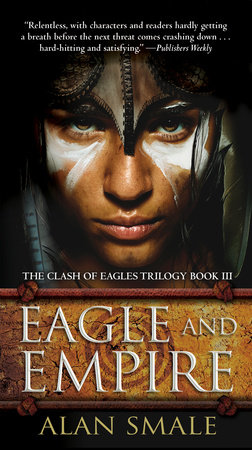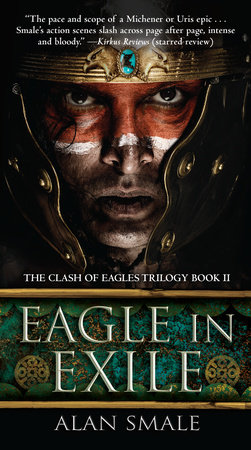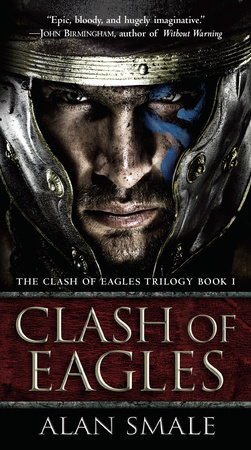Excerpt
Eagle and Empire
Part 1
Cahokia Romanus
Chapter 1
Year Eight, Planting Moon
As Marcellinus stepped out of the Southgate of the fortress of the Third Parthica, the elite horsemen of the Chernye Klobuki were wheeling around into a full charge in the torn-up grasslands just beyond. He glanced back at Enopay, but the boy was thanking the bemused sentries in perfect Latin and hadn’t yet seen the exercising Rus cavalry. To distract him, Marcellinus said, “So, your opinion of our meeting with Decinius Sabinus?”
Enopay followed him out and switched back to speaking Cahokian. “It went well. With Roman help it will be much easier to prepare the fields and plant the corn. Being willing to work for what you eat, if even a few of your precious legionaries dirty their hands with Cahokian soil, will earn you huge—oh, merda, here they come again . . .” Abandoning his dignity, Enopay jumped behind Marcellinus. Back at the gate the sentries snorted with laughter.
The Chernye squadron was charging the fortress in a tight formation, a solid line forty horsemen wide. They wore mail shirts that were slit up the sides for easy riding, over tunics of varied color and fit. Most of the soldiers in the first rank carried long spears, some held over their heads ready to strike downward and others couched; successive waves carried bows, curved sabers, or whips. Some of their helmets were tall and fluted and others were bronzed and curved, but those warriors of the most terrifying aspect wore helmets with full steel visors that mimicked human faces.
The first rank swept by Marcellinus and Enopay, wheeling so close that the clods of earth kicked up by their horses’ hooves spattered the wooden stockade. The horses, Marcellinus knew, were a purpose-bred cross between the spirited Arabs of the Near East and the steppe ponies the Mongols rode. Their manes flowed freely, and their nostrils were bloodshot; it was not unknown for Chernye horses to kick and bite the mounts of their enemies.
The second line of horsemen was on them in moments, some playfully waving their sabers. The thunder of their passing was deafening. Marcellinus stood firm, nodding in approval despite the violence of the assault on his senses, but by that point Enopay had retreated completely and was back inside the fortress gate.
The anarchy of the Chernye’s appearance was deceptive. Marcellinus had first encountered them when serving as a centurion in Kievan Rus half a lifetime ago. Turkic steppe peoples by background, mercenaries by trade, they were among the best horsemen in the Roman world. Bringing them as auxiliaries to fight the Mongols was truly fighting fire with fire, and it was a pity they had only a few hundred of the elite warriors. The Romans had brought two wings of cavalry from southern Rus, the Third and Fourth Polovtsians, nomadic horsemen almost as ferocious as the Mongols but without their conquering spirit. The Polovtsians were excellent, but the Chernye were better.
“That is the last of them?” Enopay called anxiously.
The Chernye slowed to a trot, smoothly reorganizing their ranks into a single long, straight line for their next exercise. They made that look easy. Marcellinus knew it wasn’t. “Yes. The coast is clear.”
Enopay stepped out of the fortress again. “It is not that I fear the four-legs, you understand. Merely that if they should happen to make an error . . .”
“Of course,” said Marcellinus, whose own heart was still racing. “A little prudence is quite understandable.”
They turned and walked toward the riverbank. To their right the muddy brown ribbon of the Mizipi curved away to the south, half a mile wide. To their left stood the great fortress of the Legio III Parthica. Placed well back from the riverbank just south of the old city of Cahokia-across-the-water, the Roman fortress was enormous: a full quarter mile square with ramparts that loomed twenty feet above them. As always, the castra was a hive of activity. Now that the din of the cavalry had faded, from the other side of the tall wooden stockade they could hear the almost constant sounds of running or marching feet and the barked orders of centurions.
The imago of the Imperator fluttered over the fortress at half staff, as Hadrianus was not currently within. He and his Praetorian Guard were two days’ ride to the west, deep in the prairie on an extended training exercise with the heavy armored Roman cavalry of the Ala I Gallorum et Pannoniorum Cataphractaria. Already a seasoned general when he ascended to the Imperial purple, Hadrianus liked to lead his forces from the front. And after two years in Nova Hesperia he obviously chafed for action; Marcellinus sometimes thought the Imperator might be exultant to see the massed horsemen of the Mongol Horde thundering over the Plains toward him.
As Marcellinus and Enopay approached their birch-bark canoe on the riverbank, the boy turned to him. “When the Romans go on into the west, you will go with them?”
“Perhaps I should,” Marcellinus said. “Someone needs to keep them out of trouble.”
“And I can come with you?”
Marcellinus raised his eyebrows. “You?”
“Yes, of course, me,” Enopay said. “Always you go away, and always you leave me behind. You go to the Iroqua. You go to Shappa Ta’atan. Then you sail all the way to the Market of the Mud in a dragon ship I helped you rebuild, and after that you take it up the Wemissori to the buffalo hunt, and you come back, and then you run off to Ocatan! All that time I sit here counting and writing down numbers in my book. Gaius Marcellinus sees all the land, and Enopay, who was born in it, sees nothing.”
Even now Enopay’s hand rested possessively on the satchel he always carried over his shoulder. Three chiefs of Cahokia had relied on Enopay’s record keeping, and when it came to bushels of corn or war bands of Wolf Warriors, even Decinius Sabinus regularly double-checked his quartermasters’ and adjutants’ figures against Enopay’s. It was part of the reason Enopay and Marcellinus had come to see Sabinus today.
“We were banished,” Marcellinus reminded him drily. “I was hardly voyaging to entertain myself.”
“Nonetheless, I think that next time I will stow away under your decking planks. And . . . Eyanosa?”
Marcellinus sighed inwardly. He knew what was coming next. “Yes, Enopay?”
“I want to know why the Romans of Hadrianus are really here, and what it is that none of you will tell us.” The boy fixed him with a penetrating stare. Marcellinus ignored the question; this was about the twelfth time Enopay had expressed his suspicions, and as there was nothing Marcellinus could say, he preferred to remain silent.
“So alert, the soldiers of Sabinus and Agrippa are,” Enopay said. “So busy training. The Imperator so keen to lead his expeditions into the Grass and keep his troops battle-ready. He sends quinqueremes and longships and canoes to map the Mizipi tributaries out of the west, and places fortresses at the river confluences, and eagerly awaits the accounts of his scouts when they return from their moonslong trips across the Plains. And yet still you will not speak of it to me, which means you cannot. But one day someone will let something slip . . .”
Marcellinus was surprised that it had not happened already. The officers and men of two full legions of Roma knew they had come to Nova Hesperia to fight Chinggis Khan and his Mongol army. Somehow, over the last ten months not a one of them had revealed this to the mound builders. Marcellinus was quite sure that if his own 33rd Hesperian Legion were still in existence and camped here by the Mizipi, they would have leaked the information by suppertime.
From far away they heard the faint throb of a single rhythmic drum. Enopay’s ears perked up immediately. “Ah, good! Let us hurry.”
Grateful for the distraction, Marcellinus followed Enopay along the southern wall of the castra toward the riverbank. The drums grew louder astonishingly quickly, now joined by the chirping of a martial flute.
“From upriver, then!” Enopay grinned and broke into a run. Marcellinus preserved a dignified walk.
Having just met with Decinius Sabinus in his legionary Praetorium, Marcellinus was wearing his full Roman dress uniform, and he needed to preserve dignitas in front of the officers and sentries who patrolled the wooden ramparts above him. Marcellinus possessed no authority over the troops of the Third, but had earned their grudging respect over the last year. He was not about to jeopardize that by scampering to see a ship.
Arriving next to Enopay on the riverbank, Marcellinus looked north up the Mizipi.
The quinquereme was barreling downriver in the center of the current. This was Maius, the Planting Moon, and the river was still in full spate with ice-cold meltwater.
“Now that,” Enopay said with satisfaction, “is a really big canoe.”
The quinquereme was two hundred feet long and twenty feet across at the beam. Its top deck stood fifteen feet clear of the water level, and its golden curving prow reared another twenty feet above that. The warship had its fighting towers erected at both bow and stern, with a dozen marines standing to attention atop each one. Despite the strength of the current, the quinquereme’s oarsmen were getting little relief; the three ranks of oars dipped in perfect time with the sharp notes of the flute, slicing through the eddying water like a single machine. In a concession to the sweating soldiers at the rowing benches, the louvers were open to send a breeze into the enclosed hull.
Thousands of miles from its home harbor the warship somehow still looked brand-new. Its red bulwarks and upper decks gleamed, and the green paint at its waterline was clean and almost aglow. The large eye painted on its bow for good luck glinted with malevolence.
Along its top deck the sailors and marines stood straight-backed, in good order. When unregarded the men might stand easy, but while passing Nova Hesperia’s major city the Legio VI Ferrata spared no effort to put on a good show.
“Don’t do that.”
Enopay was saluting the galley, a full-arm Roman salute, and after a moment of hesitation some of the sailors saluted him back.
“Why not?” Enopay said. “It shows them respect. Massages their pride.”
Marcellinus shook his head. Even after a full year he still felt a chill at the sight of one of Roma’s most powerful warships under weigh. He would never forget how seven of these giant galleys had assaulted Ocatan the previous spring, powering up the mighty river to crash onto its banks, their legionaries and auxiliary cavalry spilling out to storm the Mizipian town and take it with contemptuous ease. Ocatan was rebuilt now, a proud Mizipian city once more, with the Roman presence withdrawn to a fortress and harbor area thirty miles farther up the Oyo, but the dead could never be brought back to life.
The quinquereme was quickly past them. It had two steering oars that were controlled by a single helmsman using a transverse tiller, and that helmsman was having to fight to keep the ship in a steady line and not be pushed out of the current on the shallow bend. The wake from the quinquereme’s passing splashed up against the muddy bank.
Enopay’s eyes gleamed. “Perhaps I will not go west with you after all. Perhaps I will stow away on a quinquereme and go south.”
Enopay feared horses and would sooner die than fly a Thunderbird. But when it came to warships the boy was in love. Marcellinus lifted one end of their canoe and pushed it toward the water. He held it steady for Enopay to get in, then shoved off and stepped in with a single movement. Grabbing a paddle, he dug in before the Mizipi current could push the canoe too heavily to the south.
“I am sad you do not trust me, Eyanosa,” Enopay said, still following the Roman galley with his eyes as it disappeared into the distance. “I would very much like to think that one day we will be true friends again.”
“Enopay, we will always be friends. Help me paddle.”
All of a sudden Marcellinus wanted to get back into Cahokia and away from this river that was dominated so casually by the Roman warship. Even from here he could see the broad profile of the Great Mound rising above the other mounds of the city, the very tops of the giant poles that made up the Circle of the Cedars, and the smoke rising from thousands of huts spread over the five square miles where the ordinary people of Cahokia went about their daily business of grinding corn, drying meat, making pots, and scraping skins. High above the Great Mound he saw the swoop of tiny specks that could only be Catanwakuwa. To the mound’s left a Sky Lantern hung in the air.
Marcellinus did not hate Roma, far from it, but the Imperium was too harsh, too brutal a thing to share the city with. Like Enopay, Marcellinus wanted the legions to move on into the west.
He doubted it would happen soon.
Enopay was watching him soberly, having picked up on his change of mood. “Hurit?”
“And Anapetu,” Marcellinus said shortly. Despite his bedazzlement the boy did, at least, recall the grim connection between the Roman quinqueremes and the slaughter at Ocatan.
Enopay nodded and pulled hard, helping to straighten their course, and Marcellinus synchronized with him with the ease of long familiarity, and then all hell broke loose with a suddenness that almost made him drop the paddle. “Futete! What on earth?”
Great wafts of black sooty fug were rising from the Mound of the Smoke. God only knew what noxious weeds they had to burn to create such a signal. And now from the Master Mound came the din of rocks beating against tall sheets of copper.
At almost the same moment came the braying of Roman trumpets from far south of the city.
Such alarums could only mean the city was under attack from an enemy without . . . or within.
Marcellinus and Enopay glanced at each other in horror and then, as one, dug their paddles deep into the muddy waters and bent their backs, lifting the nose of the canoe out of the water in their rush.
Even as they landed on the east bank, Mahkah raced out of the city on a piebald steed, leaning forward into the gallop. He had taken to riding as if he had been doing it all his life. Marcellinus half expected to see Hanska by his side. She was also an instinctive rider, and the two of them drilled other members of the First Cahokian together.
The Mizipi bank was boggy, and Mahkah could not bring his mount all the way to its edge. He slid off the horse and stood beside it, patting its neck to calm it. Marcellinus hurried forward. “What? What is happening?”
“Fight. Big fight.”
“Another?” Enopay looked accusingly at Marcellinus.






